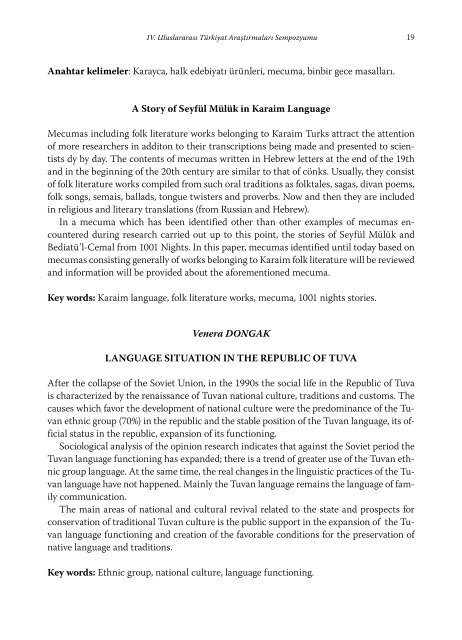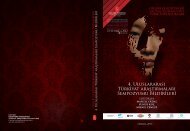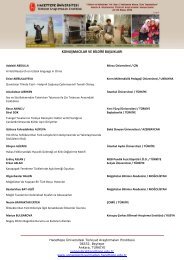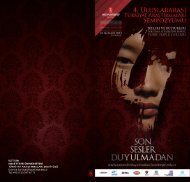bildiri özetleri - Dilleri ve Kültürleri Yok Olma Tehlikesine Maruz Türk ...
bildiri özetleri - Dilleri ve Kültürleri Yok Olma Tehlikesine Maruz Türk ...
bildiri özetleri - Dilleri ve Kültürleri Yok Olma Tehlikesine Maruz Türk ...
You also want an ePaper? Increase the reach of your titles
YUMPU automatically turns print PDFs into web optimized ePapers that Google loves.
IV. Uluslararası Türkiyat Araştırmaları Sempozyumu 19<br />
Anahtar kelimeler: Karayca, halk edebiyatı ürünleri, mecuma, binbir gece masalları.<br />
A Story of Seyfül Mülük in Karaim Language<br />
Mecumas including folk literature works belonging to Karaim Turks attract the attention<br />
of more researchers in additon to their transcriptions being made and presented to scientists<br />
dy by day. The contents of mecumas written in Hebrew letters at the end of the 19th<br />
and in the beginning of the 20th century are similar to that of cönks. Usually, they consist<br />
of folk literature works compiled from such oral traditions as folktales, sagas, divan poems,<br />
folk songs, semais, ballads, tongue twisters and pro<strong>ve</strong>rbs. Now and then they are included<br />
in religious and literary translations (from Russian and Hebrew).<br />
In a mecuma which has been identified other than other examples of mecumas encountered<br />
during research carried out up to this point, the stories of Seyfül Mülük and<br />
Bediatü’l-Cemal from 1001 Nights. In this paper, mecumas identified until today based on<br />
mecumas consisting generally of works belonging to Karaim folk literature will be reviewed<br />
and information will be provided about the aforementioned mecuma.<br />
Key words: Karaim language, folk literature works, mecuma, 1001 nights stories.<br />
Venera DONGAK<br />
LANGUAGE SITUATION IN THE REPUBLIC OF TUVA<br />
After the collapse of the Soviet Union, in the 1990s the social life in the Republic of Tuva<br />
is characterized by the renaissance of Tuvan national culture, traditions and customs. The<br />
causes which favor the de<strong>ve</strong>lopment of national culture were the predominance of the Tuvan<br />
ethnic group (70%) in the republic and the stable position of the Tuvan language, its official<br />
status in the republic, expansion of its functioning.<br />
Sociological analysis of the opinion research indicates that against the Soviet period the<br />
Tuvan language functioning has expanded; there is a trend of greater use of the Tuvan ethnic<br />
group language. At the same time, the real changes in the linguistic practices of the Tuvan<br />
language ha<strong>ve</strong> not happened. Mainly the Tuvan language remains the language of family<br />
communication.<br />
The main areas of national and cultural revival related to the state and prospects for<br />
conservation of traditional Tuvan culture is the public support in the expansion of the Tuvan<br />
language functioning and creation of the favorable conditions for the preservation of<br />
nati<strong>ve</strong> language and traditions.<br />
Key words: Ethnic group, national culture, language functioning.





